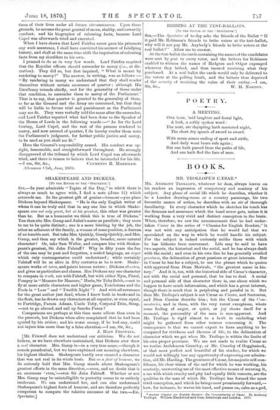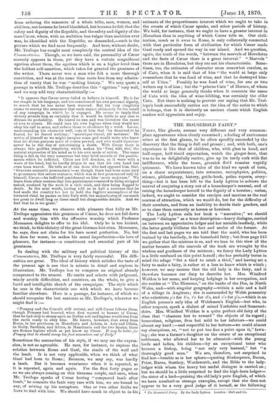BOOKS.
MR. TROLLOPE'S CiESAR..
MR. ANTHONY TROLLOP; whatever he does, always leaves On his readers an impression of competency and mastery of his subject. Any phase of social life which he describes, whether it be a London drawing-room or a country parsonage, his two favourite scenes of action, he describes with an air of thorough familiarity. In every character which he sketches his touch has the firmness and assurance which the hand never gets, unless it is working from a very vivid and distinct conception in the brain. When, therefore, we saw the announcement that he had under- taken Cx.sar in the series of "Classics for English Readers," it was not with any anticipation that he would fail that we speculated on the way in which he would handle his subject. For the subject is indeed curiously unlike those with which he has hitherto been conversant. Life may be said to have two aspects, the historical and the social, and he has always dealt with the social ; and even in his own line he has generally avoided greatness, the delineation of great passions or great interests. But in Cwsar he has for a subject, to use the phrase which he quotes with approval from Dean Merivale, "the greatest name in his- tory." And it is, too, with the historical side of Csesar's character, not with the social and personal, that he has to deal. A social and personal side of that character there is, one about which we happen to have much information, and which has a great interest, though there is much that is perplexing and painful in it. But then Mr. Trollope's subject is not Camar as Cicero, and Suetonius, and Dion Cassius describe him ; but the Cmsar of the Com- mentaries, and in them, with the very rarest exceptions, where some feeling of anger, or quiet, or joy shows itself for a moment, the personality of the man is non-apparent. And Mr. Trollope is rigid almost to a fault in excluding what might be gathered from other sources concerning it. The consequence is that we cannot expect to have anything to be compared for vividness and likeness of life, to the delineation of character which we get when Mr. Trollope is within the limits of his own proper province. We are not made to realize Camar as we realize Archdeacon Grantley, or Mr. Crawley of Hogglestock, or that most perfect and beautiful of his studies, for which we would not willingly lose any opportunity of expressing our admira- tion, old Mr. Harding. The greatness of Ctesar, his majestic self-con- fidence, his clear vision of the end for which he was working, his masterly, unswerving use of the most effective means of securing it, a use with which cruelty and pity had equally little concern, are the qualities in the man of which Mr. Trollope has formed the most vivid conception, and which he brings most prominently forward,-- how, for instance, he waves his hand, and passes on, calm as a god, • Ancient Classics for English Readers : The Co' mmentaties of Cases. By Anthony Trollope. William Blackwood and Sons, Edinburgh and London. 1870.
from ordering the massacre of a whole tribe, men, women, and children, not because he loved bloodshed, but because he felt that the safety and dignity of the Republic, and the safety and dignity of the man Cwiar, whom, with an ambition less vulgar than ambition ever was, he identified with the Republic, so demanded,—such is the picture which we find most frequently. And here, without doubt, Mr. Trollope has caught most completely the central idea of the Commentaries. Though, as we have said, the personality of Cmiar scarcely appears in them, yet they have a certain magnificent egotism about them, the egotism which is on a higher level than the boldest self-assertion, which takes for granted the greatness of the writer. There never was a man who felt a more thorough conviction, and was at the same time more free from any admira- tion of vanity that he was "making history." We may quote a passage in which Mr. Trollope describes this " egotism " very well, and we may add very characteristically :—
" It appears that Cassar never failed to believe in himself. He is far too simple in his language, and too conscious of his own personal dignity, to assert that he has never been worsted. But his very simplicity :seems to convey the assurance that such cannot ultimately be the result of any campaign in which he is engaged. He seems to imply that victory attends him so certainly that it would be futile in any case to -discuss its probability. He feared no one, and was therefore the cause -of awe to others. Ho could face his own legions when they would not -obey his call to arms, and reduce them to obedience by a word. Lucan, amderstanding his character well, says of him that he deserved to be leared, for he feared nothing;' 'meruitque timeri, nil metuens.' He writes of himself as we might imagine some god would write who knew that his divine purpose must of course prevail, and who would therefore never be in the way of entertaining a doubt. With Ctesar there is :always this godlike simplicity, which makes his Veni, vidi, vici,' the natural expression of his mind as to his own mode of action. The same thing is felt in the very numerous but very brief records of the punish- ments which he inflicted. Cities are left desolate, as it were with a wave of his hand, but he hardly deigns to say that his own hand has even been waved. He tells us of one Acco who had opposed him, that, 4 Graviore sententia pronunciata,'—aa though there had been some jury to pronounce this severe sentence, which was in fact pronounced only by himself, Cassar,—he inflicted punishment on him more majorum.' We learn from other sources that this punishment consisted in being stripped snaked, confined by the neck in a cleft stick, and then being flogged to -death. In the next words, having told us in half a sentence that he had made the country too hot to hold the fugitive accomplices of the -tortured chief, he passes on into Italy with the majestic step of one much too great to dwell long on these small but disagreeable details. And we =feel that he is too great."
At the same time, we observe with pleasure that fully as Mr. *Trollope appreciates this greatness of Cmsar, he does not fall down and worship him with the offensive worship which Professor allommsen delights to offer to his idol. Only he is too lenient, -we think, to this idolatry of the great German historian. Mommsen, -he says, does not claim for his hero moral perfection. No, but he does far worse, he makes his moral imperfection—his love of pleasure, for instance—a constituent and essential part of his .greatness.
In dealing with the military and political history of the .Commentaries, Mr. Trollope is very fairly successful. His diffi- .culties are great. The ideal of history which satisfies the taste of the present age is one that is minute in detail and copious in illustration. Mr. Trollope has to compress an original already 'compressed to the utmost. He omits and selects with judgment, wisely avoids difficulties, and contrives, on the whole, to give a lucid and intelligible sketch of the campaigns. The style which he uses is the characteristic one with which we have become familiar elsewhere. Here is a passage, for instance, of which we -should recognize the last sentence as Mr. Trollope's, wherever we -might find it :-
"Pompey and the Consuls still retreat, and still Omar follows them, though Pompey had boasted, when first warned to beware of Cassar, that he had only to stamp upon an Italian soil and legions would rise from the earth ready to obey him. He knows, however, that away from Rome, in her provinces, in Macedonia and Achaia, in Asia and Cilicia, in Sicily, Sardinia; and Africa, in Mauritania and the two Spains, there are Roman legions which as yet know no Caner. It may be better for Pompey that he should stamp his foot somewhere out of Italy."
Sometimes the mannerism of his style, if we may use the expres- sion, is not so agreeable. He uses, for instance, to express the
relation between Rome and Gaul, the simile of the wolf and the lamb. It is not very applicable, when we think of what
.Gaul had been to Rome ; Brennus, we may say, was hardly a lamb. But it becomes wearisome when it is repeated, as it is repeated, again and again. For the first forty pages or so we are always coming on this tiresome couple, and once, when Mr. Trollope speaks of Cases having "conquered lamb after lamb," he commits the fault very rare with him, we are bound to say, of mixing up his metaphors. One or two other faults we have to find with him. We should have much to object to in his estimate of the proportionate interest which we ought to take in the events of which Caesar speaks, and other periods of history. We hold, for instance, that we ought to have a greater interest in Marathon than in anything of which Ciesar tells us. Our civil- ization, much as it owes to Rome, is only collaterally connected with that particular form of civilization for which Cassar made Gaul ready and opened the way in our island. And we question, again, the truth of the words, "between the marvels of Herodotus and the facts of Cmsar there is a great interval." " Marvels " there are in Herodotus, but they are not his characteristic. Some- times, too, the estimates of character seem somewhat careless, as of Cato, when it is said that of him "the world at large only remembers that he was fond of wine, and that he destroyed him- self at Utica." Possibly he was fond of wine, for one or two writers say it of him ; but the "prisms Cato" of Horace, of whom the world at large generally thinks when it connects the name of Cato with the idea of wine-bibbing, was certainly the elder Cato. But there is nothing to prevent our saying that Mr. Trol- lope's book successfully carries out the idea of the series to which it belongs, that it is distinctly an ancient classic which English readers will appreciate and enjoy.































 Previous page
Previous page